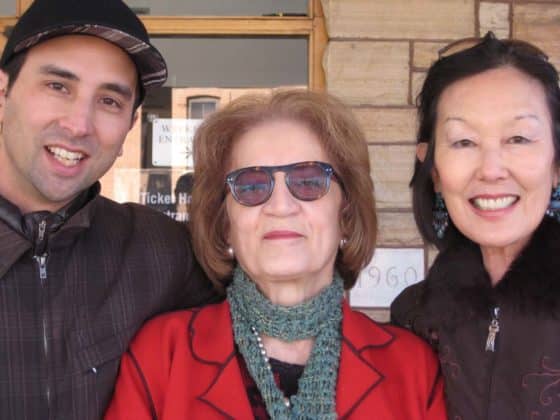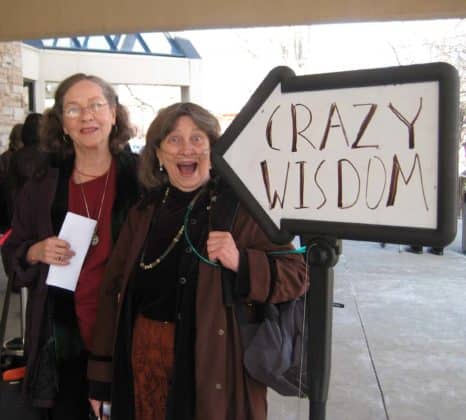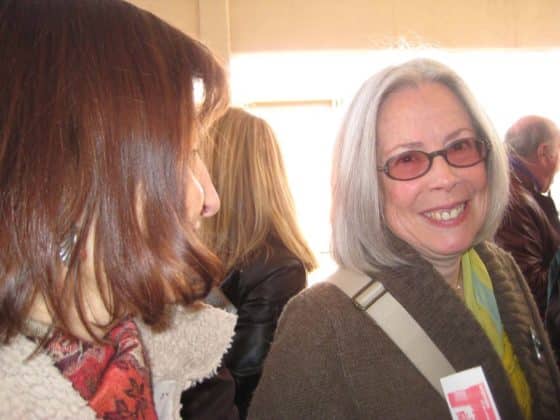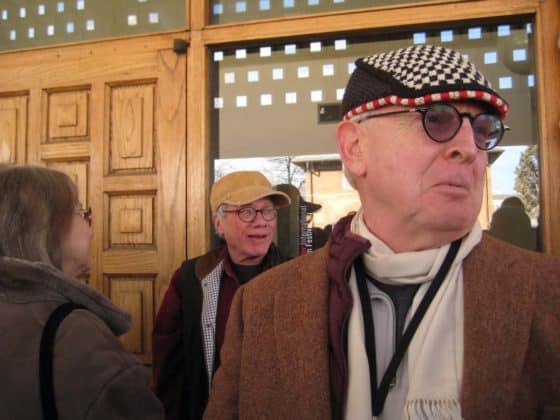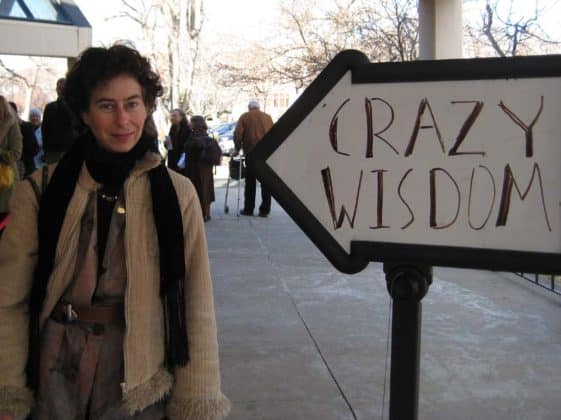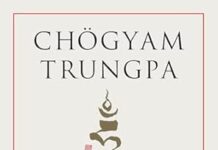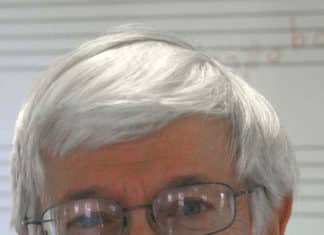As Clay Evans, a staff writer for the Boulder Daily Camera who recently reviewed “Crazy Wisdom” aptly put it, Chögyam Trungpa, Rinpoche “haunts Boulder.” I doubt he realizes to what an extent that haunted quality is true for his students, including those who knew him in the flesh and those who didn’t. In any case, flesh is what we got to see—the amazing, inscrutable, monumental and mind-stopping guru in the flesh, with beautiful photography, archival footage and rich detail encompassing almost the full range of VCTR’s activities and scope.
The showing was part of the four day Boulder International Film Festival, featuring such big names (in the actual flesh, that is) as Oliver Stone and James Franco. The venue was the First United Methodist Church, directly across the street from the Shambhala Center, with a seating capacity of approximately 650. Since it sold out early, a second showing was arranged for two days later at the Boulder Public Library, which also sold out immediately.
I arrived an hour early on the balmy Friday afternoon, and took my place in line behind six or seven people who arrived even earlier, including Kimiko Snyder and her handsome son who flew into town to accompany her to the premiere. At the very front of the line was Fred Ferraris whom I hadn’t seen in about twenty years. “Hi! I haven’t seen you in ages. Where are you living now?” I asked. “Up in Lyons,” he replied.
I had the feeling he wasn’t the only person who had come down out of the mountains near Boulder for the event. As I stood there, the line grew and grew, and so did the sense of excitement and anticipation. There were many old-timers, but at least as many new-timers and Naropa students. I have no idea how many people were simply regular Boulder residents and film enthusiasts.
The large screen covered up most of the enormous copper and brass cross at the front of the church, but you could still see the juncture where the horizontal and vertical parts met just above it. It reminded me of hearing Rinpoche teach in large churches in NYC and Boston in the 70’s. He had seemed quite comfortable there back then, as I imagine he was here, perhaps even more so than inside the Shambhala Center. Meanwhile the film festival announcer struggled to try to pronounce the Vidyadhara’s name which gave us a little chuckle.
The director, Johanna Demetrakas, was sitting immediately behind me. She seemed incredibly relaxed, her demeanor simple and ordinary yet full of presence. I asked her how it felt to be doing this here in Boulder, after the film’s debut in Santa Barbara. She said that Boulder was the place where she had really experienced and gotten to know Rinpoche, so it was special for her. “Boy, it’s gonna be fun when I take this to Boulder,” was what she had kept telling herself. I think we were all hugely grateful to her and thrilled to have her there, giving her a big round of applause before the film even began, and a huge standing ovation as soon as her name appeared in the credits at the end.
As for the experience of watching the film, you’ll all have to experience it for yourselves. I was completely drawn into it, fascinated by the richness of detail and the opportunity to revisit or learn more about the perilous journey out of Tibet and Rinpoche’s earliest students and companions in England and Scotland before coming to America. At certain points there were tears as more and more dimensions of his life activities came through, inundating the mind with memory and flooding the heart with feeling.
The Q and A period at the end of the viewing was extremely brief unfortunately, due to the film festival people needing to clear the audience out in preparation for their next event. A bunch of us headed over to the Lazy Dog on Pearl and 14th,, a sponsor of the festival, to hang out and take advantage of their free drink offer. That, too, reminded me of the old days, for I haven’t been found in a downtown Boulder bar in many years.
Knowing I would be trying to write this piece, I asked various people there how they were feeling. “Raw, open … and melancholy” said one person. I think it’s safe to say we were all deeply affected in some way, though not necessarily in exactly the same way. However, that comment seemed to name the feelings which seemed most prevalent, and permeated our interactions with each other.
Overall, it seemed to be an overwhelming success, but a few friends privately expressed to me that they wished the film had conveyed more of how truly mind-stopping and challenging it was to be in Rinpoche’s presence, where the essence of his teaching and transmission often came through most powerfully, with its almost desolate quality of stillness and space.
Since the film is intended for what will hopefully be a larger distribution to a general audience, I think it did an excellent job of going as far as it did, and I suspect that evoking our memories to the extent that it did, was responsible for stirring up an even greater longing. It was an amazing feast to take in, begging one to revisit and watch it again. No doubt this will not be the last film about Chögyam Trungpa, Rinpoche, but for this extraordinary one, Johanna, we thank you!
Postscript
Twenty-four hours later, I’ve been reflecting on the wider implications of the film’s release. At the risk of dwelling on the overplayed sensational aspects of Rinpoche’s life, which I felt were given just the right weight in the film, there are some interesting questions to examine here. I wondered whether, ironically, in trying to present an objective and unbiased perspective of Rinpoche’s most maligned activities, namely his sexual intimacy with many women and use of alcohol, the film might have shot itself in the foot.
Because no one who was interviewed in the film remotely tried to defend or explain why Rinpoche did these things, or what benefit it could have brought anyone, the general viewer would be left with no alternative way to think about these controversial aspects of his behavior — only the unexplainable paradox of someone who was a provocative teacher, seemingly driven by his personal passions which, to his credit, were not hidden. Should someone have been willing to go out on a limb just a bit more? Or was it better to leave the question totally unanswered?
In light of some of the recent reviews of the film, it seemed that the admirable choice to present these ‘facts’ without defending or explaining them did not necessarily succeed in the film being received as objective. Instead, one reviewer described the film as “one-sided”, “skews to the reverential” and as “content to leave a critical analysis to more objective, if perhaps less inspired, filmmakers”.
I wondered whether it would have been more skillful in terms of provoking people’s intelligence further, to present all three viewpoints: one suggesting how such activity actually did something positive, one suggesting the opposite, and then finally the view which dominated the film: that no one really knows and it is left for each person to decide.
I decided I needed to see the film one more time and managed to get a ticket for the second showing on Sunday afternoon. After seeing the film again, the only conclusion I could come to was that Crazy Wisdom demonstrates how easy it is for us to jump to conclusions, and how hard it is not to. There is a lot to take in, and a lot to assimilate in this film. And lack of ground is hard to handle.




